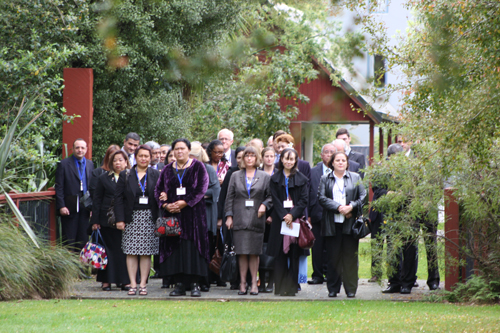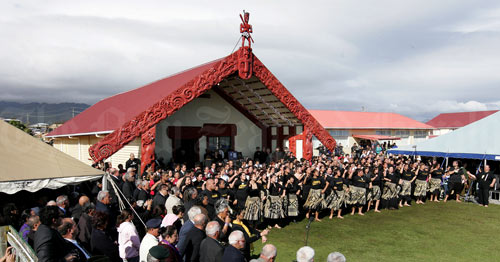Basic steps of a Pōwhiri
A welcome on to a Marae is a pōwhiri (or pōhiri). Marae are not the only places where pōwhiri take place – pōwhiri can happen anywhere that hosts (tāngata whenua) wish to formally greet a group of visitors (manuhiri).

Māori is the language used during pōwhiri. While pōwhiri may vary according to the occasion and the tribal area, Te Reo Māori (Māori language) still guides pōwhiri.

Basic pōwhiri include the following steps:
- Karanga is a unique form of female oratory in which women bring a range of imagery and cultural expression to the first calls of welcome (and response) in the pōwhiri.
- Whaikōrero or formal speech making follows the karanga. Some of the best Māori language orations are given during pōwhiri when skilled speakers craft the language into a series of verbal images. The protocols for whaikōrero during pōwhiri are determined by the kawa (practices) of the Marae or local iwi if the pōwhiri is not held on a Marae.
- Kawa or protocols can vary on each Marae. Some Marae will use pāeke (hosts speak first and visitors speak last) and some will use tū mai tū atu (alternate speeches with host first then visitor then host).
- A waiata or song is sung after each whaikōrero by the group the orator represents. It is common to hear traditional waiata during pōwhiri.
- Koha – a gift, generally an envelope of money, is laid on the ground by the last speaker for the manuhiri (visitors). A local kuia (female elder) may karanga as an expression of thanks. A male from the tangata whenua will pick up the koha.
- Hongi – the pressing of noses and foreheads signifi es the sharing of breath and knowledge between tangata whenua and manuhiri. Tangata whenua invite the manuhiri to come forward to shake hands (hariru) and hongi.
- Hākari – the feast, the sharing of a meal (harirū). This usually signifies the end of the pōwhiri.
Please note: Pōwhiri process will vary from Marae to Marae so always ensure that you speak to your local Marae before the pōwhiri to ensure that you understand the kawa (customs) and tikanga (protocols) of the Marae.
